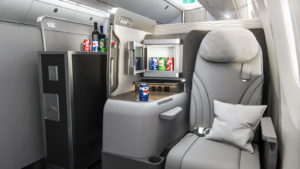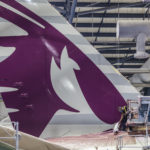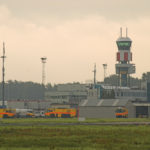Collins Aerospace has unveiled a range of new cabin designs at the Aircraft Interiors Exposition in Hamburg, Germany, including an at-seat refrigerated compartment and a concept that allows passengers to travel on board an aircraft using their own powered wheelchairs.
Its SpaceChiller, a finalist in the passenger comfort category of the Crystal Cabin Awards, is a modular thermoelectric cooling system that chills compartments without the use of refrigerants that may impact global warming, with applications ranging from premium suites and passenger social zones to single galley inserts and whole cart bays.
Cabin luxury
“The availability of chilled refreshments at one’s fingertips or in a designated passenger social zone is a luxury for travellers and delivers benefits to airlines and operators,” said Jeff McKee, director of Interiors Customer Experience and Design at Collins Aerospace. 
“SpaceChiller provides compact and convenient chilling capacity to areas that were previously limited, unable to be chilled at all or required much larger volumes of galley chillers to provide a similar service. The expanded chilling footprint enhances airline service and catering options without increasing cabin crew workload.”
SpaceChiller uses advanced heat sinks, initially developed for The Defense Advanced Research Project Agency (DARPA), that reduce power consumption up to 50 per cent over alternate thermoelectric systems.
Fly Your Wheels Suite
Collins Aerospace has also teamed up with researchers and students at the National Institute for Aviation Research (NIAR) at Wichita State University to develop the Fly Your Wheels Suite concept, which allows passengers to travel on board an aircraft using their own power wheelchairs – crucially, without eliminating existing seats.
The Fly Your Wheels Suite, a finalist in the university category of the Crystal Cabin Awards, re-engineers the left closet near the front door of a single aisle aircraft into a suite for a passenger travelling on a wheelchair.
The suite enables both forward and rear-facing orientations, depending on the occupant’s preference. If unused, the suite can easily transition back into a functional closet or an area where crew can relax.
Accessibility
“Helping enable air travel for passengers of all mobilities is an imperative for the entire air travel industry and one we are eager to continue collaborating on with our partners,” said Luis Gomez, virtual engineering manager for NIAR. “That we might be able to provide a safe, interactive and spacious solution for wheelchair users, allowing them to board, deplane and travel as any other passenger is an incredible opportunity.”

